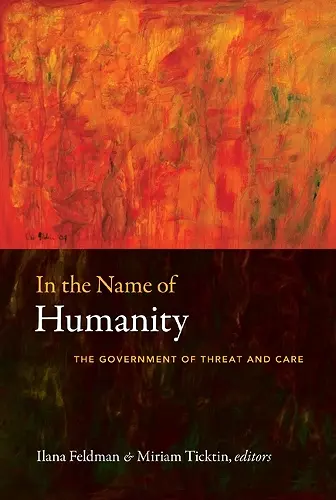In the Name of Humanity
The Government of Threat and Care
Ilana Feldman editor Miriam Ticktin editor
Format:Paperback
Publisher:Duke University Press
Published:30th Nov '10
Currently unavailable, and unfortunately no date known when it will be back

Collection of essays that consider how humanity--as a social, ethical and political category--is produced through particular governing techniques and in turn gives rise to new forms of government
Anthropological and cultural critics ask what it means to govern, fight, and care in the name of humanity, examining the question through the lenses of biotechnology, the environment, and human rights.Scientists, activists, state officials, NGOs, and others increasingly claim to speak and act on behalf of “humanity.” The remarkable array of circumstances in which humanity is invoked testifies to the category’s universal purchase. Yet what exactly does it mean to govern, fight, and care in the name of humanity? In this timely collection, leading anthropologists and cultural critics grapple with that question, examining configurations of humanity in relation to biotechnologies, the natural environment, and humanitarianism and human rights. From the global pharmaceutical industry, to forest conservation, to international criminal tribunals, the domains they analyze highlight the diversity of spaces and scales at which humanity is articulated.
The editors argue that ideas about humanity find concrete expression in the governing work that operationalizes those ideas to produce order, prosperity, and security. As a site of governance, humanity appears as both an object of care and a source of anxiety. Assertions that humanity is being threatened, whether by environmental catastrophe or political upheaval, provide a justification for the elaboration of new governing techniques. At the same time, humanity itself is identified as a threat (to nature, to nation, to global peace) which governance must contain. These apparently contradictory understandings of the relation of threat to the category of humanity coexist and remain in tension, helping to maintain the dynamic co-production of governance and humanity.
Contributors. Arun Agrawal, Joao Biehl , Didier Fassin, Allen Feldman, Ilana Feldman, Rebecca Hardin, S. Lochann Jain, Liisa Malkki, Adriana Petryna, Miriam Ticktin, Richard Ashby Wilson, Charles Zerner
“Most of the chapters in In the Name of the Humanity raise more questions
than answers, but this makes it an ideal book both for courses on human
rights and globalization and for scholars working on human rights, humanitarian interventions, and globalization more generally. The accounts are remarkably balanced, neither cheerleading for globalization under the name of humanity nor pushing a relentlessly bleak image of globalization as neoliberalism.” - Jonathan Simon, Political Theory
“[E]ach chapter grapples informatively and engagingly with the central challenges of human existence…The scholarship and diversity of research in this book will make it a valuable resource for students. More experienced readers will enjoy its depth and appreciate the opportunity to sample such a range of thought provoking perspectives on this fascinating topic.” - Dominique Martin, The Australian Journal of Anthropology
“In a complex world where competing groups claim to be speaking on behalf of incommensurate versions of ‘humanity,’ the authors represented in In the Name of Humanity ask not what humanity is but what are the epistemic, market, and governmental logics and environmental parsings that fashion humanity and the humans who will inhabit humanity in the twenty-first century.”—Elizabeth A. Povinelli, author of The Cunning of Recognition: Indigenous Alterities and the Making of Australian Multiculturalism
“Like ‘nature,’ ‘humanity’ is a Protean concept that confers immense capacity on those able to act in its name. Exploring the term and its effects from three key vantage points—humanitarianism, medicine, and environment—the papers in this outstanding collection offer up a stream of provocative insights and challenging perspectives. In the Name of Humanity is sure to become an essential reference point for future discussions of the human, its outsides, and its negations.”—Hugh Raffles, author of Insectopedia
ISBN: 9780822348214
Dimensions: unknown
Weight: 522g
392 pages